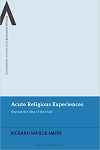DSM
Rates of Prolonged Grief Disorder: Considering relationship to the person who died and cause of death

This research paper – from Kara Thieleman, Joanne Cacciatore, and Allen Frances – has been published in the Journal of Affective Disorders. The abstract says: Background Prolonged Grief Disorder (PGD) was recently included in DSM-5-TR. The rate of PGD is known to…
Read more
Acute Religious Experiences: Madness, Psychosis and Religious Studies
Psychiatry’s Cycle of Ignorance and Reinvention: An Interview with Owen Whooley

Ayurdhi Dhar has interviewed sociologist Prof. Owen Whooley – author of On the Heels of Ignorance : Psychiatry and the Politics of Not Knowing – about psychiatry’s stubborn perseverance in the face of recent DSM embarrassments and the failures of the biomedical model. The interview…
Read more
Leading Psychiatrists Unwittingly Acknowledge Psychiatry Is a Religion, Not a Science

This article by Dr. Bruce Levine has been published by Mad in America. It begins: “Since the seventeenth century, Enlightenment thinkers have distinguished science from religion, and by at least one critical distinction, leading psychiatrists have unwittingly acknowledged that major constructs…
Read more
Book Review: ‘Evidence-biased Antidepressant Prescription’ by Michael P. Hengartner

This book review by Marion Brown has been published by BJGP Life (which publishes comment and opinion on research and clinical care for the primary care community): “Hengartner begins ‘Over my academic career, I went into different stages of belief and disbelief.’…
Read more
The Book of Woe: the DSM and the unmaking of psychiatry

This book comes from Gary Greenberg. The publishers say: “Since its debut in 1952, the American Psychiatric Association’s Diagnostic and Statistical Manual of Mental Disorders has set down the “official” view on what constitutes mental illness. Homosexuality, for instance, was a mental illness…
Read more
Studying Mental Health Problems as Systems, Not Syndromes
Are you mentally ill, or very unhappy? Psychiatrists can’t agree
Book of Lamentations

“DSM-5 arranges its various strains of madness solely in terms of the behaviors exhibited. This is a recurring theme in the novel, while any consideration of the mind itself is entirely absent. In its place we’re given diagnoses such as ‘frotteurism,’…
Read more




